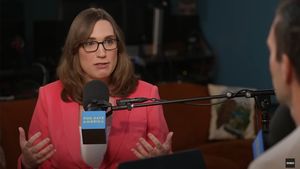Research shows that students with learning or developmental disabilities are suspended at a disproportionate rate compared to their able-bodied peers.
Despite needing the most help, students with disabilities have often been the first to be removed from classrooms after indicating behavioral difficulties, harming their academic development. The recent shortage in educators has exacerbated the issue, as schools nationwide report understaffed or insufficient trained instructors, particularly in those working with disabled students.
A study from The Hammill Institute on Disabilities and The Council for Learning Disabilities concluded: "Although research has shown the ineffectiveness of suspension as a disciplinary tool, school administrators continue to use it to combat behavior infractions."
Beyond formal suspension, students with disabilities are often punished with an equally damaging practice -- informal removal. While the phrase was coined by the National Disability Rights Network (NDRN), it is defined by U.S. Education Departments as the "administrative removal of a child from school for a sufficient period of time to constitute a change of placement without the necessary legal protections."
“The reality is that we have no idea exactly how many children are removed from school each year because school districts do not include informal removals in reports to the public,” said NDRN Executive Director Curt Decker. “But we do know that our network represents hundreds of such children per year and that these removals hurt them.”
A common scenario that the NDRN reports details students with disabilities being sent to the principal's office where, instead of issuing a formal suspension, administrators will contact the student's parents to pick them up. In one case from the NDRN, three students with autism were repeatedly sent home after staff deemed the students to be “too hard to handle.” Through informal removal, one student was not in school for almost a year.
Another scenario from The Associated Pressdetails the mother of a student with ADHD who was consistently forced to leave work and pick him up, even in cases where he was bullied by other students. The school threatened to call Child Protective Services if his mother did not comply.
Catherine E. Lhamon, assistant secretary for civil rights at the Department of Education, told AP: “Schools are excluding students for reasons that are unlawful. We want our kids to be in class, learning with other students, fully participant and respected as learners. We do not want our school communities to be sending a message that there’s some category of kids who can’t be there.”
All students regardless of ability are required to attend school for a certain period of time each year. If a student reaches ten suspensions in a given year, parents have the legal right to meet with administrators to request further accommodations. By keeping removals off-record, schools are able sweep students with disabilities under the proverbial rug, despite federal law mandating that children with disabilities who need additional services receive them, and that they receive an equal education to their peers.
“Informal removal and lost instructional time have long-term negative economic, health, and community impacts for individual children and their families,” said NDRN Managing Attorney Diane Smith Howard. “Federal, state, and local officials must take action to stop the practice of informal removal.”



















































